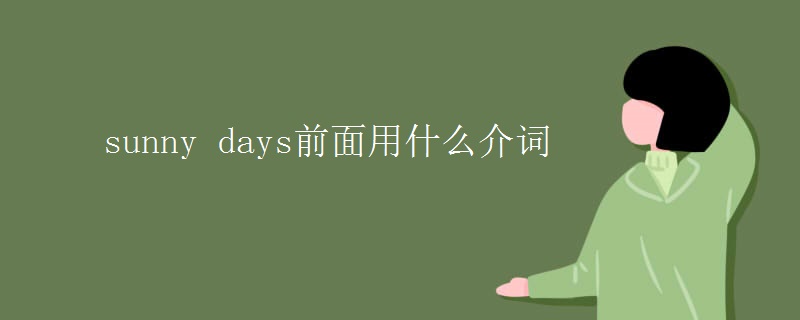介词加关系代词引导的定语从句
2019-12-13 11:38:25文/叶丹介词加关系代词引导的定语从句主要用于正式文体。直接用于介词后作宾语的关系代词which不能换成that,直接用于介词后作宾语的关系代词whom不能换成who。

“介词+关系代词”引导定语从句
1.由“介词+关系代词”引导的定语从句主要用于正式文体,在非正式文体中通常将介词放至句末。
如:This is the man to whom I referred.我指的就是这个人。
This is the man (whom) I referred to.我指的就是这个人。
2.直接用于介词后作宾语的关系代词which不能换成that,直接用于介词后作宾语的关系代词whom不能换成who。但若介词用于句末,则用作宾语的which,whom也可换成that,who,或者省略。
如:这是一个我们讨论了许多的问题。This is a subject about which we have talked a lot.(which不能换成that,也不能省略)
This is a subject which we have talked about a lot.这是一个我们讨论了许多的问题。(which可以换成that,也可以省略)
3.关系副词when,where,why根据情况有时可换成“介词+关系代词which”。
如:That is the day when[=on which]he was born.那就是他出生的日子。
That is the house where[=in which]he lived.那就是他住过的房子。
That is the reason why[=for which]he must apologize.那就是他必须道歉的原因。
4.在很正式的文体中,“介词+关系代词”引导的定语从句可紧缩成“介词+关系代词+不定式”结构。如:在那儿孩子们有个玩耍的花园。正:There the children had a garden in which to play.(很正式)
正:There the children had a garden in which they could play.(较正式)
正:There the children had a garden to play in.(较口语化)
注:这类“介词+关系代词+不定式”结构中的介词不能没有,也不能放在句末。如不能说There the children had a garden which to play in.
“介词+关系代词”的结构
1.“介词+ which”在关系分句中分别可作时间、地点和原因状语,代替相应的关系副词when, where和why。如:
①I still remember the day on which (=when) I first came to school.我仍然记得初来学校的那一天。
②The factory in which (= where) I work is a large one.我工作的工厂是一个大厂子。
2.“介词+ which(指物)/whom(指人)”在关系分句中作地点状语,表示存在关系,关系分句主谓常须倒装。如:
①They arrived at a farm house, in front of which sat a small boy.他们来到一处农舍,前边坐着一个小男孩。
②I saw a man, on the head of whom stood a bird.我看见一个人,他的头上有一只鸟。
3.“不定代词或数词+ of + which(指物)/whom(指人)”在关系分句中作主语,说明整体中的一部分。如:
①China has a lot of islands, one of which is Diaoyu.中国有许多岛屿,其中之一是钓鱼岛。
②There are a lot of students here, none of whom like the film.这里有许多学生,他们之中无人喜欢这部电影。
4.“介词+ which(指物)/whom(指人)”在关系分句中作目的、方式或地点状语。如:
①Could you tell me for whom you’ve bought this coat? 你能告诉我这件衣服是给谁买的吗?
②The man, from whom I learned the news,is an engineer.这人是一位工程师,我是从他那里得到这个消息的。
5.“介词+ which(指物)/whom(指人)”用于被动结构的关系分句中,作状语,说明动作的执行者。如:
①The wolf by which the sheep was killed was shot.伤害羊的那只狼被打死了。
②The man by whom the wolf was shot was a good hunter.打死狼的那人是一个好猎手。
6.“名词+of which”代替“whose+名词”在关系分句中作定语。如:
①I saw some trees,the leaves of which (= whose leaves ) were black with disease.我看见一些树,它们的叶子因害病而发黑。
②He mentioned a book, the title of which (= whose title) I’ve forgotten.他提到一本书,书名我忘了。
7.“介词+which(指物)/whose(指人)”修饰后边的名词。如:
①It rained all night and all day, during which time the ship broke into pieces.雨下了一天一夜,就在这期间轮船撞碎了。
②The driver was the man from whose room she had stolen the maps.司机就是那个男人,她从他的房间偷走地图。
8.“介词+which+不定式”。此种用法多见于正文体中,相当于一个带有主语和谓语的定语从句。如:
She had only 1.87 with which to buy (=she could buy) Jim,her husband,a present.她只有一元八角七分钱,用这些钱她给丈夫吉姆买一件礼物。
 介词的用法
介词的用法英语中介词后面必须跟名词、代词、动名词(-ing)...
2020-12-18 什么是介词 后面跟什么
什么是介词 后面跟什么汉语前置词,在语法里是一个用来表现一个字的文法功能...
2020-11-10 副词可以修饰介词吗
副词可以修饰介词吗如果语义需要的话,副词(主要是程度副词)可以用于修...
2020-07-22 动词和介词的区别
动词和介词的区别动词是动作本身,介词是对动词的性质、范围、位置等进...
2020-07-22 sunny days前面用什么介词
sunny days前面用什么介词on sunny days在晴朗日子里。原因是:介...
2020-07-17 weekend前面用什么介词
weekend前面用什么介词weekend前的介词只能用at或on,区别为意思...
2020-07-04 home前面加什么介词
home前面加什么介词如果是“动”态的,就不加介词,如:go home ...
2020-07-01 球在树上为什么用on
球在树上为什么用on实际上是有关介词in和on的区别。介词in和on在...
2020-06-27 介词后面可以跟句子吗
介词后面可以跟句子吗介词后面可以加宾语成分,称为介宾。名词,名词性从句...
2020-06-24 不及物动词加介词构成谓语吗
不及物动词加介词构成谓语吗不及物动词+介词:look for;介词+名词:a...
2020-06-19 季节前面用什么介词
季节前面用什么介词季节前面用介词in。in、on、at表示时间的时候...
2020-06-04 英语介词后面接什么词
英语介词后面接什么词英语介词后面接名词、代词、动名词。有时名词会有修饰...
2020-01-18 介词后面跟什么词性
介词后面跟什么词性英语中,介词后面经常跟名词或名词词组、代词、动名词...
2020-01-14 介词to的用法
介词to的用法介词to的用法:后面跟名词或动名词,表示方向,表示...
2020-01-13 night前面用什么介词
night前面用什么介词night前面用介词at或in,构成短语at ni...
2020-01-11
点击查看 高中英语语法 更多内容









